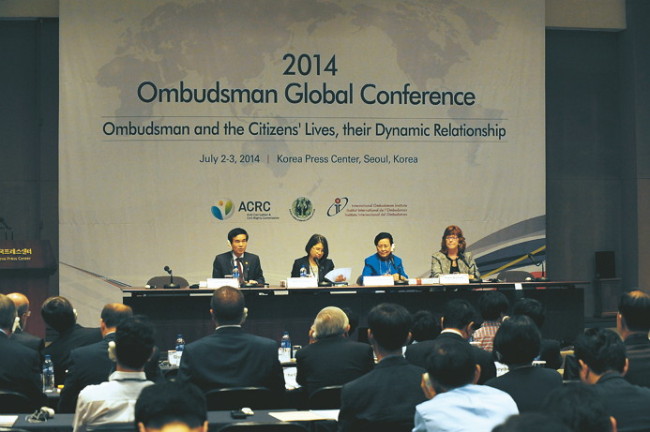ACRC adapts to changing roles of ombudsmen
Participants at meeting of watchdog institutions stress the need for new strategies to reflect shifts
By Yoon Min-sikPublished : July 2, 2014 - 20:49
When Sweden coined the word “ombudsman” in the early 19th century, the idea was to keep a watchful eye on possible maladministration by authorities. Two centuries later, the concept has spread all over the world as nations have called for the need for an impartial watchdog which can resolve conflicts in a clash of interests.
But the role of an ombudsman has changed over time along with society, and the heads of ombudsman institutes from 12 countries across the world gathered Wednesday in Seoul to discuss their new roles and how to carry them out efficiently.
The 2014 Ombudsman Global Conference brought together civil rights commission chiefs from Korea, the U.S., Austria, Canada, Japan, China (including Macau and Hong Kong), Malaysia, Ireland, Iran, Indonesia, Thailand and Pakistan.
The two-day meeting, titled “Ombudsman and the Citizens’ Lives, their Dynamic Relationship,” featured 25 speakers along with experts from the World Bank and officials from various Korean watchdogs who discussed the growing importance of ombudsmen.
“While the ACRC has made progress in building a “transparent and fair system in our society by monitoring and correcting flawed government systems,” Lee Sung-bo, the ACRC chief said, the agency still faces many challenges that lead to infringement on people’s rights.
But the role of an ombudsman has changed over time along with society, and the heads of ombudsman institutes from 12 countries across the world gathered Wednesday in Seoul to discuss their new roles and how to carry them out efficiently.
The 2014 Ombudsman Global Conference brought together civil rights commission chiefs from Korea, the U.S., Austria, Canada, Japan, China (including Macau and Hong Kong), Malaysia, Ireland, Iran, Indonesia, Thailand and Pakistan.
The two-day meeting, titled “Ombudsman and the Citizens’ Lives, their Dynamic Relationship,” featured 25 speakers along with experts from the World Bank and officials from various Korean watchdogs who discussed the growing importance of ombudsmen.
“While the ACRC has made progress in building a “transparent and fair system in our society by monitoring and correcting flawed government systems,” Lee Sung-bo, the ACRC chief said, the agency still faces many challenges that lead to infringement on people’s rights.

“Most of the countries participating in this conference may also experience a similar situation despite some differences,” he said. “In this regard, I firmly believe that the 2014 Ombudsman Global Conference will provide a valuable and meaningful opportunity for ombudsman institutions from Asia, Europe and North America to share their ombudsman systems and experience of interacting with people, as well as to discuss the path forward for future development.”
Lee will speak Thursday about enhancing the watchdogs’ capacity to respond to social conflicts, particularly about the Korean agency’s efforts in dealing with collective complaints. These involve numerous parties’ interests and require ombudsman organizations to act as mediators of conflict.
The ACRC’s former head Kim Young-ran took the podium as the first speaker to explain how the role of the Korean ombudsman system has changed in response to social demands. As Korea experienced a rapid transition from an agriculture-based nation to one of the most advanced countries in the world, the role of ombudsmen was also altered, she said.
The group became instrumental not only in protecting the rights of people from unlawful administrative decisions, but also monitoring government bodies and preventing problems from occurring.
It is also crucial for the government to regain people’s confidence in them, she said. In order to do so, the ACRC must strictly monitor the government to ensure transparency in an objective way.
Kim also emphasized the importance of passing an act that prohibits civil servants and their relatives from receiving payments regardless of whether it was a bribe. The act to prevent government officials from engaging in corruption became a hot-button issue after a deadly ferry sinking in April revealed a series of corrupt practices by former and incumbent civil servants.
“I believe that this law should be enacted to encourage the ombudsman officials to refuse illegal solicitations in order not to have their fairness and objectivity suspected in dealing with civil complaints and carrying out anticorruption activities,” she said.
The ombudsman institutes of today face several challenges, said Diane Welborn, second vice president of the International Ombudsman Institute. These include the privatization of services needed by the public, increased data collection from governments and corporations, and continuing struggles against corruption, which hinders efforts to satisfy citizens.
A particularly pressing issue is the privatization of public services, which is a hotly disputed issue around the country. When the interest of the investing corporations clash with the needs of citizens, the role of a mediator becomes crucial.
“When a service is becoming privatized and when those discussions are happening, the government may still be responsible for those services,” she said. “That is the prime time to get the ombudsman involved, in the beginning. So that citizens’ rights can be protected.”
But finding the appropriate actions to take in an ever-changing society is a tough task, she said.
“Ombudsmen will and have to change to meet the crisis of the times. But right now, we’re having trouble figuring out some of those ways. Because it’s a challenge,” Welborn said.
Panit Nitithanprapas, the president of the Asian Ombudsman Association, emphasized the importance of improving the citizens’ rights. To achieve this, interaction among the powers, citizens and ombudsmen is necessary, she said.
In the afternoon sessions, the speakers discussed the ways ombudsmen can enhance social trust and the quality of public services, and how technological advancement will help improve the efficiency of ombudsman services.
The conference will resume Thursday to discuss the ombudsman’s role, both in fighting corruption and as a mediator in social conflicts.
By Yoon Min-sik (minsikyoon@heraldcorp.com)










![[Hello India] Hyundai Motor vows to boost 'clean mobility' in India](http://res.heraldm.com/phpwas/restmb_idxmake.php?idx=644&simg=/content/image/2024/04/25/20240425050672_0.jpg&u=)









